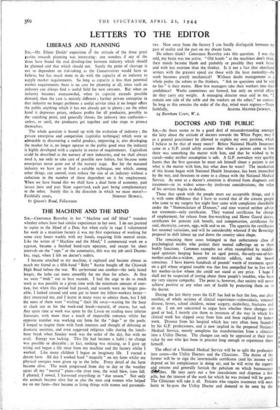THE MACHINE AND THE MIND
S1R,—Constance Reaveley in her " Machine and the Mind " wonders whether others have had similar experiences to her own. I do not pretend to aspire to the Mind of a Don, but when early in 1940 I volunteered for work in a munition factory it was my first experience of working for some sixty hours weekly with my hands, requiring little mental strain. Like the writer of "Machine and the Mind," I commenced work on a capstan, became a finished band-turn operator, and except for short intervals on the " taps " or the automatics, this was my job until Decem- ber, 5943, when I left on doctor's orders.
I became attached to my machine, it replaced and became almost as much my friend as a fifth-hand " Baby " Austin bought off the Chiswick High Road before the war. We understood one another—the tools lasted longer, the lathe ran more smoothly for me than for others. At first we were " both " out to beat records. I had the urge to do as much work as was possible in a given time with the minimum amount of exer- tion, but when this period had passed, and records were no longer pos- sible, I looked around and soon got to know my fellow-workers better— they interested me, and I learnt in many ways to admire them, but I felt the most of them were " wishing" their life away—waiting for the hour to clock out or for the week-end break—natural, of course, but sad. Any spare time at work was spent by the Lassie on reading most inferior literature, with more than a touch of impossible romance whilst her opposite number was working out form for the " dogs " or the pools. I longed to inspire them with fresh interests and thought of debating or dramatic societies, and even suggested religious talks during the lunch- hour break when Sunday work was the order of the day, but with no avail. Energy was lacking. This life had become a habit ; no change was possible or desirable ; in fact, nothing was missing, so I gave up trying and began a life away from my machine and .the factory whilst I worked. Like many children I began an imaginary life. I started a dream farm. All day I worked hard " mentally " on my farm whilst my physical energies were given up to the lathe. Every detail of the farm became alive. The work progressed from day to day or the weather upset all my " mental" plans—the river rose, the wind blew, trees fell. I planted, I sowed, I harvested everything in "due season." Not only the animals became alive but so also the men and women who helped me on my farm—they became as living things with names and personali-
ties. Now away from the factory I can hardly distinguish between mt past of reality and the past on my dream farm.
Do others think? Constance Reaveley asks this question. I was also told, my brain was too active. " Old hands " at the machines don't think, their minds • become blank and probably or possibly they work better and with less exertion than the thinker. Is it not a fact that shorthand writers with the greatest speed are those with the least mentality—the work becomes purely mechanical? Without doubt management as a whole prefer the robots to the thinkers. " Ask no questions and be told no lies " is their motto. How few managers take their workers into their confidence? Works committees are formed, but only on trivial affairs do they carry any weight. A managing director once said to me, "I remain one side of the table and the workers on the other," no contact. So long as this remains the order of the day, mind must regress.—Yours


























 Previous page
Previous page